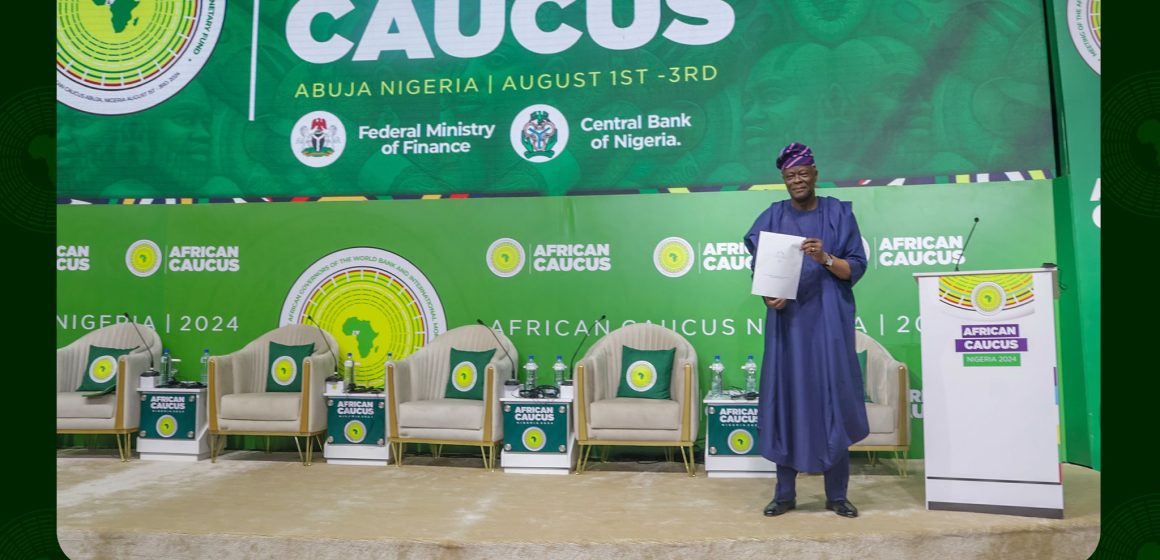The 2024 African Caucus Meeting of Governors of the International Monetary Fund (IMF) and the World Bank Group (WBG) was held in Abuja, Nigeria, from August 1–3, 2024. The meeting was organized by the Federal Ministry of Finance, under the direction of Mr. Wale Edun, the Honorable Minister of Finance and Coordinating Minister of the Economy, and the Central Bank of Nigeria, under the direction of Governor Olayemi Cardoso.

President Tinubu, accompanied by Nigeria’s Vice President, His Excellency, Senator Kashim Shettima, officially opened the three-day event.
In person, the gathering drew Ministers and Governors of Central Banks from fifty African nations as well as other eminent panelists from abroad, such as the Rt. Hon. Lord Paul Boateng of the UK House of Lords, Secretary General of the African Continental Free Trade Area (AfCFTA), Mrs. Amina Mohammed, Deputy Secretary General of the United Nations, members of Nigeria’s Federal Executive Council, and country delegates from throughout Africa and beyond, including representatives from the Bretton Woods Institutions (BWIs).

Facilitating Intra-African Trade: Catalyst for Sustainable Development in Africa is the theme for the 2024 Caucus Meeting, which identifies key drivers of growth and development throughout the continent.
The conference acknowledged the value of intra-African trade in enabling the continent to produce more, attract investments, and create jobs. It also considered the fact that African nations still trade more with each other than with the rest of the world. The conference concluded that in order to increase Africa’s share of global trade and promote inclusive and sustainable growth on the continent, it was imperative to address both tariff and non-tariff barriers to intra-African trade, such as fragmented payment ecosystems, inadequate energy access, a lack of infrastructure, inconsistent regulatory frameworks, and uneven cross-border procedures.
The discussion also emphasized how trade could promote economic expansion by opening doors for higher levels of investment, production, and employment creation. Larger markets, fresh technology, and funding are all made available. By lowering trade obstacles, harmonizing laws, and easing the flow of products and services throughout the continent, the African Continental Free Trade Area (AfCFTA) seeks to advance trade among African nations.
In order to increase intra-African trade, the Governors highlighted four important avenues:
fortifying the payment ecosystem across Africa,
improving connectivity, accessibility, and affordability of energy;
making use of collaborations with MDBs, and
updating the world’s financial system.
The Caucus also urged the World Bank Group and the IMF to make sure that their assistance to member nations is still consistent with their own policies and is guided by fairness and balance. These factors are especially crucial now that nations are dealing with severe external shocks and have enormous financial demands.
This meeting was held in the midst of a synchronized global economic slowdown, with global GDP growth slowing as a result of developing nations tightening their monetary policies and supply chain disruptions brought on by geopolitical tensions, such as those surrounding the Palestinian and Ukraine crises. Opportunities for development are further hampered by these factors. The GDP growth of Africa demonstrates the continent’s remarkable resilience, but intra-African trade still accounts for a relatively small portion of total African exports—roughly 14.4%.
In order to address both ongoing and new issues like climate change, food insecurity, energy deficit, and fragility, the Caucus restated the appeal made by heads of state to donor nations for an ambitious and substantial IDA21 replenishment with a US$120 billion target.
A memo summarizing the results of the 2024 African Caucus discussions will be presented to the heads of the BWIs in October 2024 at the IMF and WBG’s annual meetings in Washington, D.C.
This Abuja declaration, which summarized the key points of the meeting’s discussions, was released at the end.
In order to give African governors a stronger voice on matters of shared interest, the African Caucus was founded in 1963. The African Union (AU) members of all African nations are eligible to join the Caucus. The IMF and WBG currently have 54 member countries in Africa.
The central bank governors and ministers of finance, as well as other government-designated representatives, serve as the representatives of the respective nations. With the IMF and WBG, they are referred to as African Governors.
African Governors typically come to a consensus on the major issues facing the continent that the BWIs should be focused on during the Caucus Meetings. They then relay this information to the BWI Heads during the Annual Meetings through a Memorandum. Following delivery, the BWI leadership reacts by describing how their individual institutions intend to handle these difficulties, including continued initiatives in this regard. The first was created on September 11, 1964, and was called a Memorandum.
Annual rotation occurs for the African Caucus Chairmanship. Every two years, the Caucus convenes. Usually during the final week of July or the first week of August, the inaugural meeting takes place in the host nation of the Caucus Chairperson. The second meeting is held in October at the IMF and WBG Annual Meetings location. The African Caucus secretariat is jointly run by the Offices of the Executive Directors (EDs) that represent the host nation on the IMF and WBG Boards. Therefore, the Offices of the Executive Director Africa Group 3 at the World Bank Group (WBG) and Office of the Executive Director African English at the IMF, where Ayanda Dlodlo and Willie Nukunyanda represent Nigeria at the WBG and IMF, respectively, are providing administrative support for the 2024 Caucus Meetings.



Leave a Reply